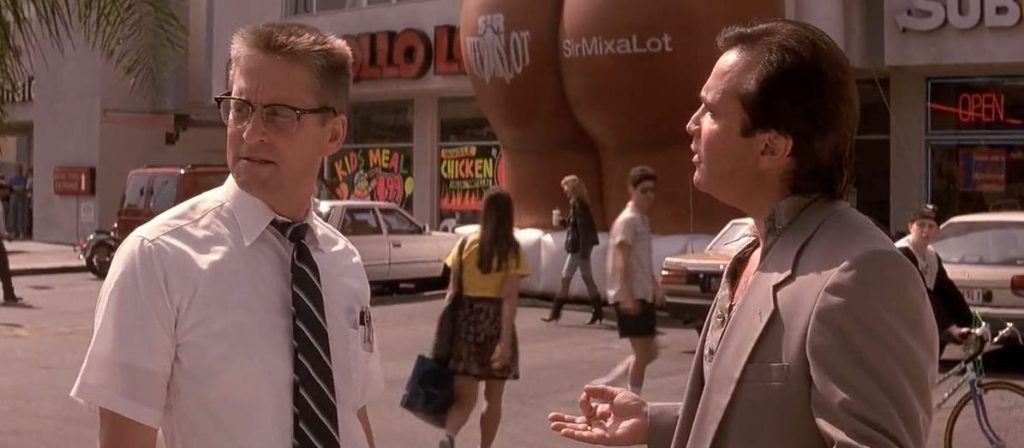
It’s a rampage!
Hard-workin’ man wake up and don’t have a say.
Single-mom minorities destroyin’ what his daddy made.
Bitches thinkin’ they can do his job,
And why?
Because he didn’t stop it the very first day.
I’m done watching my ship sink into the sea,
If no one’s gonna bail, it has to be me.
I have a barn in the backwoods, my private retreat, cuz inside it’s
Filled with high caliber, mach velocity, fully automatic,
Rapid fire, Chain fed, pump-action, muzzle-guided,
Incendiary, hollow point, gas cooled, laser-sighted
Solutions! To what ails little ol’ me.
Rampage! I said it’s a rampage!
Check your local news and there I’ll be.
—Excerpt from “Rampage”, a single off the author’s third album “Bart Cobb Works Through His Divorce”.
If there’s one thing I hate as a correspondence school film analyst (and notary public) it’s writers and directors missing the story. It’s right there, for everyone to see, and then somebody pipes up and says, ‘Isn’t that a little too harsh’ and before you know it a good idea is watered down, picked apart, softened, and what you get is piping hot etouffee served with two dozen ice cubes in it, resulting in a watery entree capped with a thin coating of quickly hardening crawfish fat. It may still be edible, but it ain’t what the menu promised.
People will say I demand too much, that my ideal treatment of Falling Down couldn’t be made to this I say then it shouldn’t be made, or it had to be in a different place, presenting a different set of tensions, or at a different time, presenting a different set of social strains. If you intend to make a zeitgeist picture, make the picture, if you can’t, don’t make the picture (you’ll be hearing the word ‘zeitgeist’ a lot in this review, fair warning). Though Falling Down could have been the zeitgeist picture it set out to be and could have had all the raw, exposed nerve of the Early 90s, it failed. Though it has moments of near-genius, the marvelous sequences are smothered under a mountain of artistic compromise and tedious eggshell-walking.
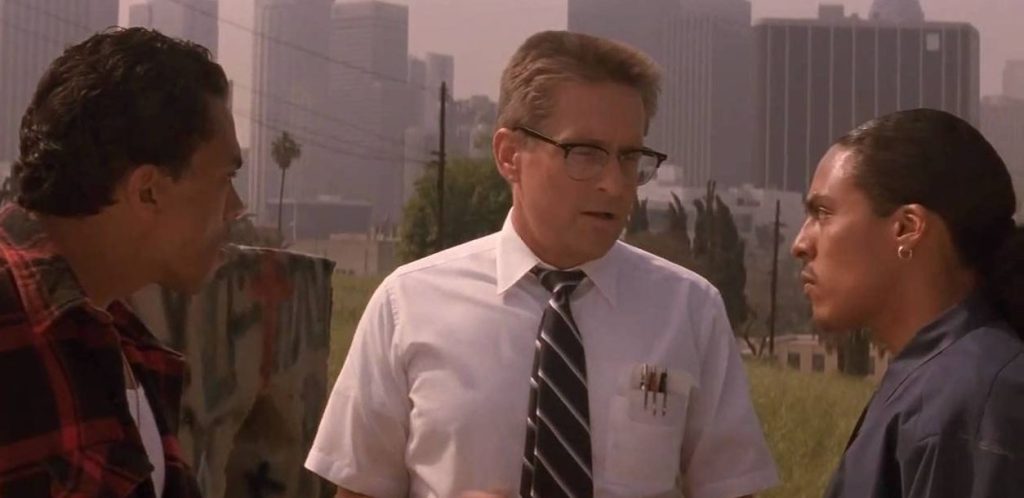
William Foster (Michael Douglas) is a man. Any man, really. The sturdy, rock-solid, crew-cutted American stable as a wing-backed chair in front of a rabbit-eared Zenith, sober. Reliable. Resilient. The kind of man your father claimed to be when he was yelling at your mom.
And then he snaps and goes on a kill-crazy crusade through hot-as-Liz-Hurley 90s L.A..
Poor Bill Foster lost his last marble right on film in the BEST visual representation of the quiet moment that starts every sawed-off-swansong in a target-rich urban killscape: sitting in traffic.
Let me describe how brilliant the first five minute-sequence is: completely wordless save for the radio, we are treated to cuts from car to man, to traffic, to fly buzzing around man’s face, to sweat, to yelling motorists, to Foster’s eyes, to squelch of the radio, the fly refusing to be swatted, to sweaty forehead, to foster itching his neck in a short-sleeve company man shirt with pocket protector and on and on until WE, WE dear reader, Completely. Fucking. Understand.
When he goes dead -eyed, grabs his briefcase and abandons his car right in the middle of the choked highway, we can almost hear the pop of Foster’s final flash-bulb of sanity. And goddammit, we’re with him.
First, he wants change for the payphone. The convenience store clerk says he has to buy something, but if he buys the soda, he won’t have enough. Pop! “I’m rolling back prices to 1965,” he says and then wrestles the baseball bat away froi the clerk and smashes everything , he asks the price, if it’s too high, he uses the bat, until he again asks the price of the soda, the clerk, nursing a busted arm, wisely quotes “fifty cents.” “Sold.,” says Bill Foster, opens the register, gingerly tucks the buck within and withdraws two quarters.
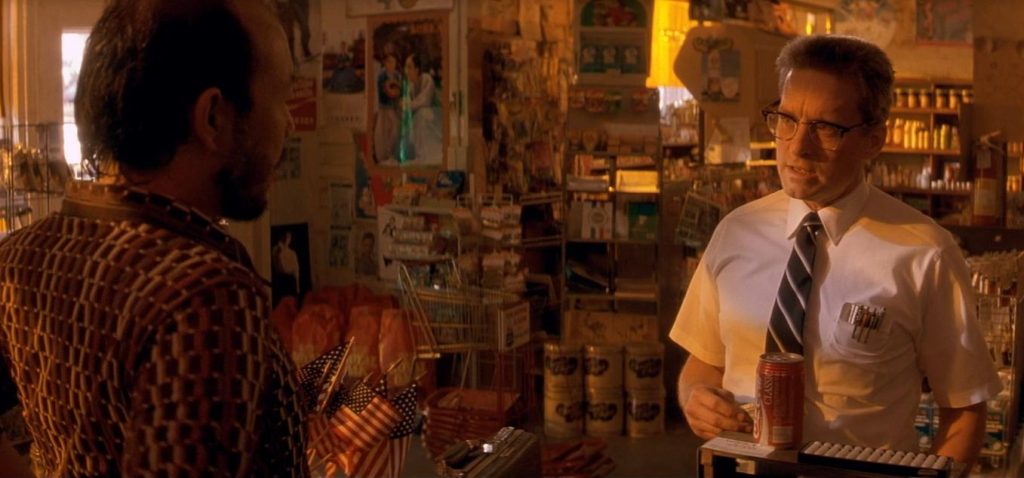
He sips his soda when two gang members threaten him with a knife (here is the first real peep of of 1993 L.A. reality, but not too much, we don’t want people thinking he’s [shudder] racist…as if it would racist to actually identify the fact that 90s L.A. was an orgy of pitiless almost-exclusively black violence) he uses his bat to get their knife. They roll back looking for him, they shoot and hit several bystanders, but not him, then lose control and crash. He strolls over and grabs their gun.
Right about now he’s getting the attention of Robert Duvall, a cop on his last day on the job, as mayhem pours in, he starts to piece the perp descriptions with the guy who abandoned his car in traffic that morning, about ten cars in front of him.
He discovers William Foster works for a defense contractor. He was recently laid-off. He has an estranged wife and little girl and today happens to be the little girl’s birthday. Then why was he in traffic in the first place? in the standard-issue uniform of a Barry Goldwater campaign staffer. Because, in a depressing, pathetic company man move, the poor guy was pretending to go to work and only carried his lunch in that briefcase…and a no-frills lunch at that: just thin whole wheat sandwich and an apple, not even a Star-Crunch…I would have settled for a Swiss Roll or a Zebra Cake, something to give me hope, because we all know when Little Debbie disappears, Chaos will replace her.
Still, the sad loss of identity in that visual is stunning…like I said, this could have been great.
Duvall’s character, like Foster, is primed for the trash heap, and it gives him an extra dose of sympathy when they meet, but, of course, by then, William Foster is a killer, and with his little daughter clinging to her mother in fear just behind Duvall, poor William decides he doesn’t want to see her grow up from behind a piece of plate glass with a phone stuck to her ear. So, he removes that possibility from play.
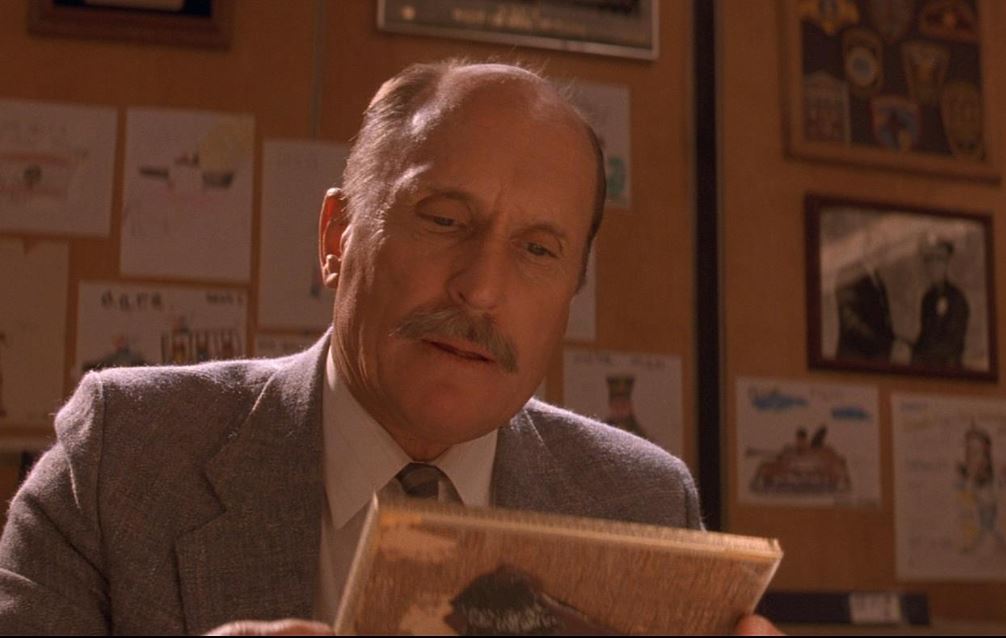
The plot is straightforward and simple, only one other scene will get any note in this review. Foster, early in his rampage, is hidden from police by the owner of a military surplus shop whose been listening to the police scanner. We quickly discover he’s a neo-nazi, bearing a spent can of Zyklon-B in his back room ‘just for fun’–here is where the movie first began to grate, because they went out of their way to say “See, Foster isn’t a Nazi, he even says so.” The characteristics of this Nazi, other than stating he was one and having holocaust trinkets strewn about, is asking the female detective who rides with Duvall why they don’t call female officers “officer-esses”–this damn flick insinuated that a tell-tale sign of a Nazi is his insistence on noun-gender! Bells went off, from then on I knew what I was looking at was a film that had zero long-term interest in examining the times, the tensions or the intolerances of 1993 in any serious way.
Written, filmed and representing (or purporting to represent) the America just after the L.A. Riots, everybody thought they could understand Bill Foster, and how just the right combination of bad luck and clusterfuck can send a man over, and we sympathized with him. In the racial powder-keg of L.A. county, once the bastion of white, suburban promise and decent middle-class American optimism, now a sweaty, dusty, unruly void of black crime and Mexican polka music, the middle class cracker became a foreigner in his own country…to those who hate white people their concerns go unmulled, regarded small, and the white bearer a petty privilege-besotted baby for even bringing it up as a negative, such as the fact that you couldn’t see the ocean from the road anymore, because it’s now blocked by twenty scenic miles of welfare housing.
Bill Foster suppressed the cloud of bad thoughts as long as could, until a lay-off, a bitch, daughter-denying wife and a restraining order made him see what he must do: fix it all, in one bleary-eyed afternoon of carnage…the wastes of Los Angeles encouraged as well as hindered him, the stakes kept climbing and fixes kept requiring new tools, he went from baseball bat, to knife, to pistol, to machine gun, until he’s firing a rocket launcher pursued by a legion of cops. Just as the story unfolds, we, the audience, rub our greedy hands together…-Ohh, goody, we said Whitey gonna tear the place up! and he did, like a sleepwalker tears up that cheesecake you were saving, in a wobbly, de-contextualized blur that stole all the terminal power from the narrative.

from “The Ballad of the Roof Koreans”: One hundred men perched in the sky/protecting goods that are overpriced/I give free wig in hell, you hear them say/ or your black ass will be my pay.”
Those Koreans deserve a holiday for that, we could call it ‘You-Want-Some-More-Rick-James’…uh, ‘-teenth’, I guess.
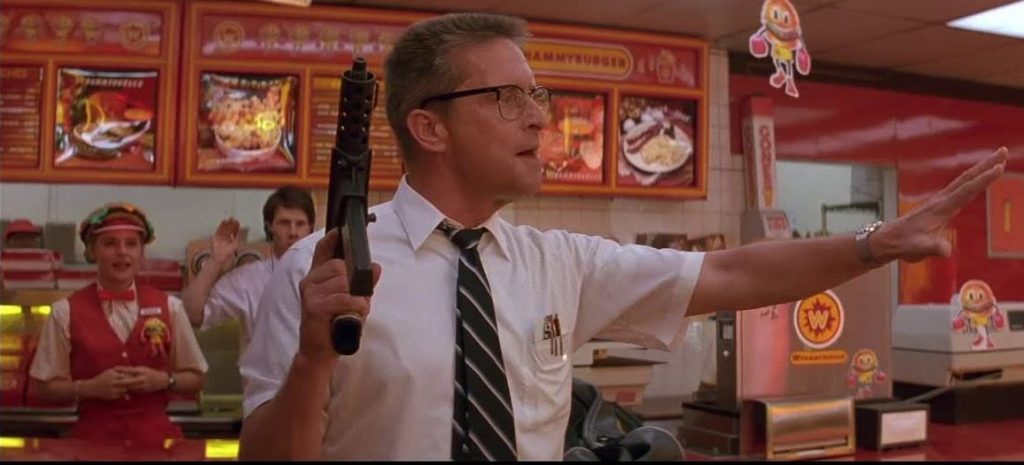
When a white man goes batshit, he should go batshit in a white fashion, through white means, shoved onward by white motivations. Not in a politically neutral, screen tested, multi-cultural fashion approved by a diverse cross-section of potential movie-goers…Why? –BECAUSE NO ONE GOES BATSHIT BY COMMITTEE! The sensitivity police were on full patrol from the time Foster left his car and began his foray into what promised to be G. Gordon Liddy’s hookah fantasy but was sadly drenched in meh by minute seven. That’s right, I’m downgrading this movie because it wasn’t G. Gordon Liddy’s hookah fantasy.
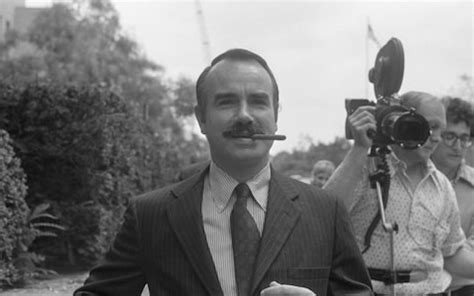
Why? Not racist enough for you, boomer? Asks the campus shit-heel who couldn’t discern a character’s motivation unless it was printed on a Pokemon card. Yes, I retort, to their dull, bucktoothed visage…because tribal tensions were rattling to rivet-breaking oscillations in the early nineties, and you’d know that if you weren’t taught history by Caillou and his pussy-whipped beta-dad. (and if you EVER call this Gen-Xer a ‘boomer’ again, you bike-helmet-wearin’ halfwit, I’m going a shove a Rubic Cube so far up your Inner Space it’ll hit Max Headroom and you’ll Walk Like an Egyptian for 48 Hours).

“I’m smiling, because as soon as you shut your smug avacado-hole, I’m going to demonstrate how your mother sounds in bed.”
This could have been a classic of contrarian cinema, there’s real sympathy and depth in the initial treatment of Douglas’ character. The White American as the deserving shit-eater and causeless villain that permeates fifty years of Hollywood output opened up a great opportunity to counter-write and take a razor blade of observation to the American condition, while simultaneously imbuing their story with the actual zeitgeist, instead of the Playskool, no corners, non-choking hazzard 90-minutes they rolled out to the public…there is no truth in a film if you can step on it in your bare feet and NOT wake up the whole house with a thunderclap of screeching profanityâthat’s when you know it’s art! And because the fearful, tone-deaf, port-side politicians that made this movie somehow never realized that RACISTS MAKE GREAT ANTI-HEROES and PLEASING EVERYBODY IS FOR HOOKERS AND EPISCOPALIANS they snatched this pretty good movie from the jaws of the Criterion Collection and spat it out on late-night HBO. Forever.
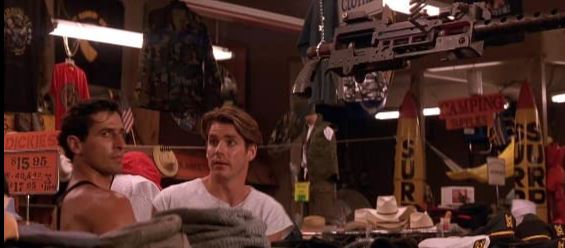
“If you want something done right, do it yourself, that’s what they taught me in the Marines–alright, scene one, gang member using a white infant to blugeon Jesus. All set?! Sound?! Roll film.”
But perhaps another excerpt from my song catalog can express what I’m saying about this movie and why it gets only a tenuous B-, the song is called “Or” from my sophomore effort Bart Cobb’s Lawyer-advised Proof-of-Income Album:
“She said, like no other, I was a mystery,
Was I cruel or was I kind, was I wise or hopelessly blind
Should she have called the cops on me,
Or was I a rogue deserving sympathy,
Did her jeans make her look fat,
Or was I joking when I said that.
Was I crude or dumb, was I mean or fun
Was I decent or lude, a pervert or prude.
Was I trustworthy or not alone with her friend,
Was I Lex Luthor or was I Superman?
She just could make no sense of me,
So with bag in hand, she looked back
From a wide-open door, as I sat
And asked my answer, tearfully
So I said:
Why do you say ‘or’?
A man can be two things,
Simultaneously,
Just like you’re two entirely different kinds of bitch,
Three kinds of nag, and countless varieties of whore
But no, I’m not a duplicitous, mercurial brat, no ma’am: I wasn’t joking
Those jeans DO, in fact, make your ass look fat.”
See, that’s all I was trying to say.